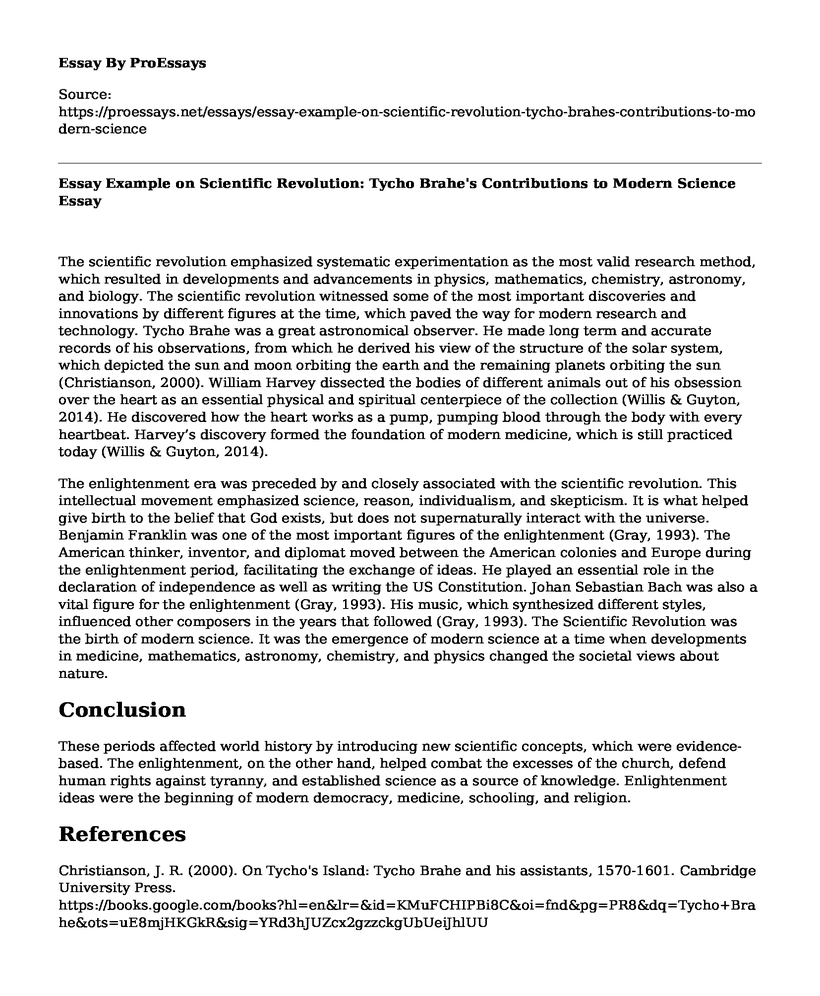The scientific revolution emphasized systematic experimentation as the most valid research method, which resulted in developments and advancements in physics, mathematics, chemistry, astronomy, and biology. The scientific revolution witnessed some of the most important discoveries and innovations by different figures at the time, which paved the way for modern research and technology. Tycho Brahe was a great astronomical observer. He made long term and accurate records of his observations, from which he derived his view of the structure of the solar system, which depicted the sun and moon orbiting the earth and the remaining planets orbiting the sun (Christianson, 2000). William Harvey dissected the bodies of different animals out of his obsession over the heart as an essential physical and spiritual centerpiece of the collection (Willis & Guyton, 2014). He discovered how the heart works as a pump, pumping blood through the body with every heartbeat. Harvey’s discovery formed the foundation of modern medicine, which is still practiced today (Willis & Guyton, 2014).
The enlightenment era was preceded by and closely associated with the scientific revolution. This intellectual movement emphasized science, reason, individualism, and skepticism. It is what helped give birth to the belief that God exists, but does not supernaturally interact with the universe. Benjamin Franklin was one of the most important figures of the enlightenment (Gray, 1993). The American thinker, inventor, and diplomat moved between the American colonies and Europe during the enlightenment period, facilitating the exchange of ideas. He played an essential role in the declaration of independence as well as writing the US Constitution. Johan Sebastian Bach was also a vital figure for the enlightenment (Gray, 1993). His music, which synthesized different styles, influenced other composers in the years that followed (Gray, 1993). The Scientific Revolution was the birth of modern science. It was the emergence of modern science at a time when developments in medicine, mathematics, astronomy, chemistry, and physics changed the societal views about nature.
Conclusion
These periods affected world history by introducing new scientific concepts, which were evidence-based. The enlightenment, on the other hand, helped combat the excesses of the church, defend human rights against tyranny, and established science as a source of knowledge. Enlightenment ideas were the beginning of modern democracy, medicine, schooling, and religion.
References
Christianson, J. R. (2000). On Tycho's Island: Tycho Brahe and his assistants, 1570-1601. Cambridge University Press. https://books.google.com/books?hl=en&lr=&id=KMuFCHIPBi8C&oi=fnd&pg=PR8&dq=Tycho+Brahe&ots=uE8mjHKGkR&sig=YRd3hJUZcx2gzzckgUbUeiJhlUU
Gray, R. T. (1993). The Dialectic of" Enscentment": Patrick Süskind's Das Parfum as Critical History of Enlightenment Culture. Publications of the Modern Language Association of America, 489-505. https://www.jstor.org/stable/462617
Willis, R., & Guyton, A. C. (2014). The Works of William Harvey. University of Pennsylvania Press. https://muse.jhu.edu/book/28650
Cite this page
Essay Example on Scientific Revolution: Tycho Brahe's Contributions to Modern Science. (2023, Aug 31). Retrieved from https://proessays.net/essays/essay-example-on-scientific-revolution-tycho-brahes-contributions-to-modern-science
If you are the original author of this essay and no longer wish to have it published on the ProEssays website, please click below to request its removal:
- Mathematical Puzzles
- Weather and Disasters
- Atmospheric Pressure Variation and Aviation Paper Example
- Temperature Pattern Exercise Example
- Heat Transfer From a Circular Cylinder Paper Example
- Witnessing the Great Egyptian Pyramids: A Mystery Unveiled - Essay Sample
- Essay Example on Ohio State: A Midwestern State in the US







